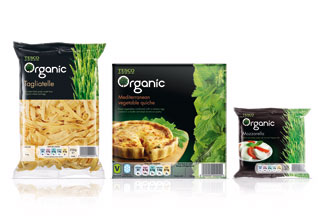
British shoppers, it seems, could be losing their appetite for discount labels. According to Tesco, fewer consumers are abandoning premium and ethical foods in favour of cheaper alternatives.
If Tesco's research is correct, it could raise questions about the expansion
of low-end supermarkets. Aldi and Lidl, for example, blossomed in the
UK after the economic downturn took hold, and the ease with which they collected customers compelled even Tesco to reincarnate itself as ‘Britain's biggest discounter'.
Now, the country's biggest retailer claims that its Finest, Organic and Fairtrade ranges are beginning to recover, with many of the products in these categories achieving significant sales growth.
At the end of 2008, sales in Tesco's organic range had fallen by 29% year on year. This decline has now slowed to 5%, according to Tesco's like-for-like figures for the eight weeks to 9 July, and the supermarket says sales of organic food could fully recover by the autumn.
Tesco produced its data in response to research by PR agency Cohn & Wolfe, which claimed that most consumers would continue to shun premium food after the recession had ended. In the agency's poll of 1005 consumers, 69% said they would still cut back on organic food when the economy recovered.
Most food retailers, including the upmarket Waitrose, have invested a great deal of money in cheaper ranges in the belief that economic recovery is a long way off.
However, Cohn & Wolfe's survey is contradicted not only by Tesco's data, but also by a recent TNS Worldpanel report, entitled ‘Discounter boom tails off'. The latter states: ‘There are several signs that shoppers have adopted a more measured approach to the recession and have started to revert to pre-recession behaviour.'
Aldi's failure in the past year to grow its market share, which in the three months to 14 June was 2.9%, according to TNS, could be a sign that discounters are struggling to win customers. Likewise, Lidl's market share has been stagnant at 2.3%.
Undeterred by the figures, Aldi claims that it will continue with its plan to increase its UK store count from 467 to 1500 outlets.
Paul Foley, group managing director of Aldi UK and Ireland, insists the retailer is in a strong position. ‘Regardless of the economic climate, our proposition remains the same and we continue to appeal to shoppers who realise they can have high quality at an affordable price,' he says.
‘Traditionally, during economic uncertainty, people retire into their comfort zones and stick to what they know. However, this isn't the case at Aldi,' adds Foley. ‘We are finding that more of our customers are using us for their whole shop, as they switch from the supermarkets and brands they are more familiar with.'
Gwyn Burr, customer director at Sainsbury's, is not surprised that the predicted rise of the discounters has failed to materialise. ‘The media in particular had a field day over how massive [this rise] was going to be, but most retailers never bought it, and it has not come to pass,' she says. ‘All the discounters combined are still smaller than Kwik Save was. So they are still, and will always be, niche players - a function they perform perfectly well.'
Tony Treacy, managing director of Publicis-owned retail agency Ideas to Market, believes that the likes of Aldi and Lidl still play an important role for UK consumers. ‘Growth [in their market share] has stalled, but year on year their sales are up because they attracted customers who continue to buy from them,' he says.
It is worth noting that the sales increase within Tesco's Finest and Organic ranges is not all it seems to be - the supermarket admits that many of its premium products have been subject to ‘buy one get one free' discounts.
Perhaps the only clear conclusion from the conflicting research is that consumers want the best of both worlds - premium food at a discount - and Tesco has adjusted its sales strategy accordingly. The situation is more opaque for the low-end supermarkets, and they will need to find new ways of gaining loyalty from fickle shoppers.

